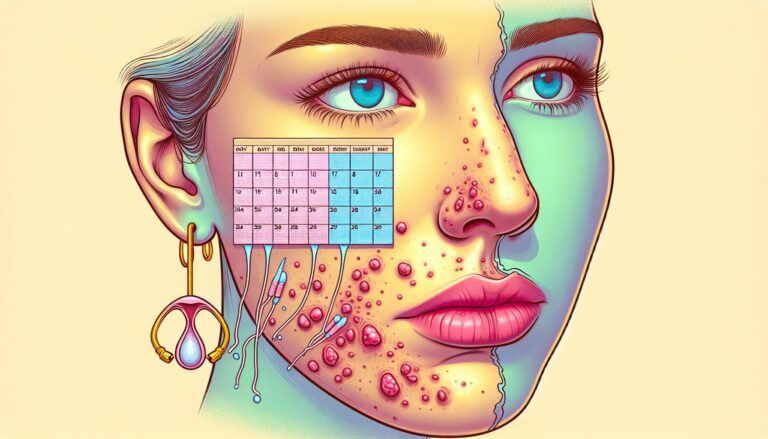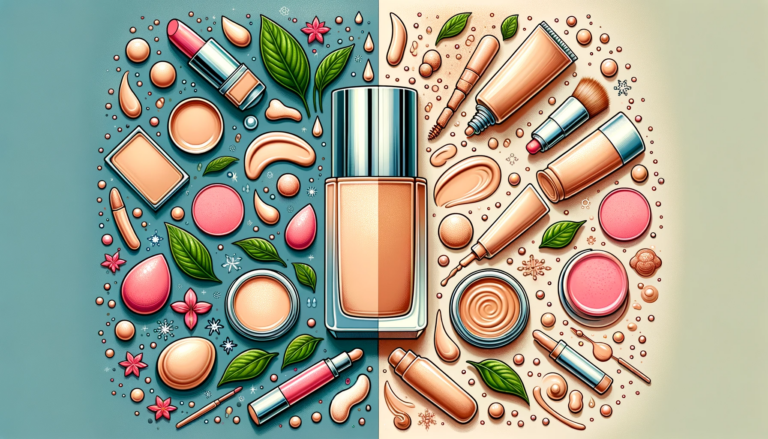Matcha Tea for Acne
Struggling with acne can feel like an endless battle, but what if the solution was as simple as sipping on a cup of tea?
Matcha tea, a vibrant green treasure from Japan, isn’t just for your morning energy boost—it might just be the acne-fighting ally you’ve been searching for.
Packed with powerful antioxidants and anti-inflammatory properties, matcha goes beyond a delicious drink. It’s a holistic approach to tackling acne from the inside out.
Imagine enjoying a calming cup of tea while giving your skin the nutrients it needs to heal and glow.

Understanding Acne
Acne isn’t just a teenage problem; it affects people of all ages, disrupting skin health and confidence. You might not realize it, but acne is a complex condition caused by the interplay of hormones, bacteria, and inflammation on your skin.
At its core, acne develops when your skin’s hair follicles become clogged with oil and dead skin cells. This can lead to whiteheads, blackheads, or pimples. Factors that can worsen acne include hormonal changes, diet, stress, and certain medications.
Recognizing what triggers your acne is a crucial step towards finding the right treatment. It’s about understanding your skin’s needs and responding with the right care.
Introduction to Matcha Tea
Matcha tea, a vibrant green tea powder from Japan, has been a cornerstone in traditional tea ceremonies for centuries. It’s made from the nutrient-rich leaves of the Camellia sinensis plant, which are finely ground into a powder. Unlike other teas, when you drink matcha, you’re consuming the whole tea leaf, not just the brewed water. This means you’re getting a higher concentration of antioxidants, vitamins, and minerals.
Rich in catechins, a class of plant compounds in tea that act as natural antioxidants, matcha is particularly high in a catechin called EGCG (epigallocatechin gallate), which is renowned for its health benefits. These antioxidants help combat the cellular damage caused by free radicals, reducing inflammation and potentially lowering your risk of several diseases.
Matcha tea isn’t just for drinking. It’s versatile enough to be used in smoothies, desserts, and even skincare products. This adaptability, combined with its health benefits, makes matcha a popular choice for those looking to improve their well-being.
The Power of Antioxidants
In discussing matcha tea’s benefits for acne, it’s crucial to focus on antioxidants. These are your skin’s best friend in its fight against inflammation and cellular damage. Matcha is particularly rich in a type called catechins, powerful antioxidants that combat inflammation and the bacteria that contribute to acne.
One catechin, EGCG (epigallocatechin gallate), stands out for its potent properties. Research shows EGCG can reduce sebum production, a key factor in acne development, by inhibiting the activity of hormones that trigger oiliness.
Here’s a quick overview of how matcha’s antioxidants can benefit your skin:
- Reduce inflammation
- Fight bacterial growth
- Lower sebum production
Incorporating matcha into your diet or skincare routine provides a natural, holistic approach to managing acne. Its high antioxidant content addresses the root causes of acne, promoting clearer, healthier skin.
Anti-inflammatory Properties of Matcha
Matcha is not just a refreshing beverage; it’s a powerhouse of anti-inflammatory benefits that can help combat acne effectively. The main component in matcha responsible for its anti-inflammatory properties is EGCG (epigallocatechin gallate), a type of catechin renowned for its health benefits.
When you incorporate matcha into your daily routine, you’re not only enjoying a delicious drink but also leveraging its potential to soothe and reduce inflammation in your body. This includes the skin, where inflammation plays a crucial role in the development of acne. By reducing this inflammation, matcha helps in calming down the irritated skin, reducing redness, and preventing acne flare-ups.
Moreover, the antioxidants in matcha work alongside EGCG to protect the skin from environmental stressors. These components help in neutralizing harmful free radicals, minimizing damage, and keeping your skin looking healthy and vibrant. With regular consumption, matcha can be a valuable addition to your skincare regimen, offering a natural way to support clearer, more radiant skin.
How Matcha Tea Helps in Fighting Acne
Matcha tea’s magic in battling acne lies in its rich composition. When you sip on this vibrant green beverage, you’re consuming a powerhouse of antioxidants and anti-inflammatory agents. These components target acne in ways that topical treatments can only dream of. Let’s break down how matcha aids in clear skin pursuits.
First off, matcha is packed with catechins, notably epigallocatechin gallate (EGCG), which visibly reduce inflammation and bacterial growth involved in acne formation. This isn’t just speculation; science backs it up. Incorporating matcha into your routine supports your skin from the inside, addressing root causes of acne such as excess sebum production and inflammation.
Another plus is matcha’s ability to defend against environmental stressors. Free radicals from pollution and sunlight contribute to acne and skin aging. Matcha’s potent antioxidant properties neutralize these radicals, safeguarding your skin’s health. This not only addresses current acne issues but also prevents future breakouts.
So, by regularly enjoying matcha, you’re not just treating yourself to a delicious drink; you’re empowering your skin to be at its best. Remember, it’s about consistency. Making matcha a staple in your diet could be the turning point for your skin.
Including Matcha Tea in Your Skincare Routine
Integrating matcha tea into your skincare routine might sound unconventional, but it’s a simple step that could yield visible results for your acne-prone skin. Matcha isn’t just for sipping—it’s a versatile ingredient that can be incorporated into various skincare products. Face masks and scrubs infused with matcha powder can provide your skin with a potent dose of antioxidants, directly targeting the areas affected by acne.
Creating a DIY matcha face mask is straightforward. Mix a teaspoon of matcha powder with water to form a paste, apply it to your face, and let it sit for about 15 minutes before rinsing. This natural remedy can help reduce redness and inflammation, thanks to the high levels of catechins like EGCG found in matcha.
For daily care, consider adding a few drops of matcha tea to your moisturizer or serums. This won’t just amplify the anti-inflammatory benefits but also assist in neutralizing those pesky free radicals, guarding your skin against environmental stressors.
Remember, consistency is key. Regular use of matcha-infused skincare products can enhance their effectiveness, gradually leading to a clearer and more radiant complexion.
Conclusion
Embracing matcha tea as part of your skincare routine offers a natural and effective way to combat acne. Its rich antioxidant and anti-inflammatory properties not only help in reducing inflammation and bacterial growth but also protect your skin from environmental stressors.
Whether you’re sipping on a cup of this vibrant green tea or incorporating it into your skincare products, matcha provides a holistic approach to achieving clearer and healthier skin. Remember, consistency is key.
Regular use of matcha, whether in your diet or as part of your skincare regimen, can make a significant difference in your skin’s appearance. So why not give your skin the care it deserves with the healing powers of matcha?






